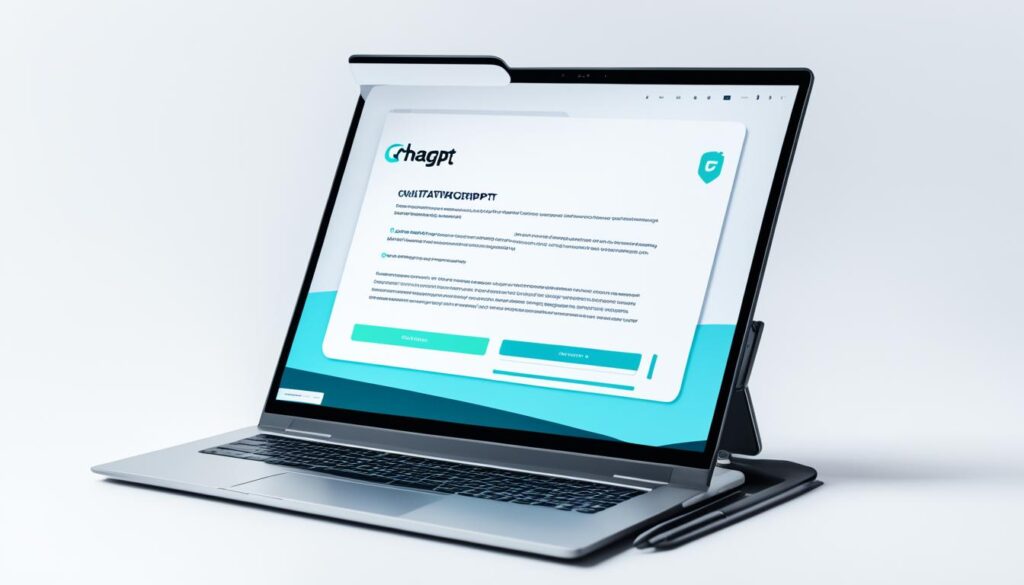ChatGPT is changing how we handle intellectual property. This AI tool can simplify trademark and copyright applications. It uses advanced language processing to make IP registration easier and faster.
ChatGPT acts as an AI-powered assistant for IP management. It helps users navigate complex legal requirements. This tool can save time and resources for businesses and professionals.
Key Takeaways
- Discover how ChatGPT can streamline the trademark and copyright application process
- Explore the potential of natural language processing in IP management
- Learn about the benefits of using an AI legal assistant for intellectual property registration
- Understand the role of machine learning in enhancing IP protection
- Gain insights into successful case studies of ChatGPT implementation for IP applications
Leveraging AI to Streamline Intellectual Property Registration
Advanced AI technologies like natural language processing (NLP) are transforming intellectual property (IP) registration. ChatGPT and similar tools can revolutionize IP application drafting. These innovations make the process more efficient and accessible for everyone.
The Potential of Natural Language Processing
NLP algorithms analyze legal documents and identify key elements for IP applications. Natural language processing for IP saves time and resources for legal professionals. It ensures well-structured applications that follow necessary guidelines.
Automating the Application Process
AI-powered IP application tools automate various aspects of registration. They streamline form submissions and track application status. An AI legal assistant reduces administrative burdens, allowing teams to focus on high-value tasks.
AI-driven technologies promise a more efficient IP registration landscape. They pave the way for an accurate and automated application process. As the legal industry embraces AI, rights holders can expect a smoother journey.
| Benefit | Description |
|---|---|
| Time Savings | AI-powered tools can expedite the drafting and submission of IP applications, streamlining the overall process. |
| Improved Accuracy | NLP algorithms can help ensure that applications are well-structured and comply with legal requirements, reducing the risk of errors. |
| Enhanced Accessibility | The automation of various application steps can make the IP registration process more accessible to a wider range of individuals and businesses. |
“The integration of AI-driven technologies into the IP registration landscape holds immense promise, paving the way for a more efficient, accurate, and automated application process.”
Understanding the Role of ChatGPT in IP Management
ChatGPT’s role in intellectual property (IP) management is growing more important. This AI model can streamline various aspects of IP workflows. It enhances research, documentation, compliance, and strategic decision-making processes.
ChatGPT’s natural language processing skills are a major asset. It understands legal terms and IP concepts well. This AI can help with patent applications, trademark filings, and copyright registrations.
The AI also assists in IP portfolio management. It automates tasks and empowers professionals to make informed decisions. By analyzing data, ChatGPT provides valuable insights and recommendations.
“ChatGPT’s integration into the IP landscape has the potential to revolutionize the way we approach intellectual property protection and enforcement.”
However, using ChatGPT in IP management comes with challenges. We must consider data privacy and ethical implications. The potential impact on the legal profession needs careful thought.
IP professionals should stay informed about this evolving technology. Strategic integration of AI tools can maximize benefits. It’s crucial to mitigate risks while leveraging these new capabilities.
ChatGPT offers both opportunities and challenges in IP management. Understanding its capabilities and limits is key. IP professionals can use it to improve operations and decision-making.
By embracing this technology, professionals can stay ahead in IP protection. The ChatGPT era brings new possibilities to the field of intellectual property.
How to Use ChatGPT for Completing Trademarks and Copyrights Applications
AI is changing how we handle intellectual property. ChatGPT helps simplify trademark and copyright applications. This tool makes the process easier and more efficient.
Users can now tackle complex registrations with less hassle. ChatGPT’s language skills smooth out the journey. It’s a game-changer for protecting creative works.
Step-by-Step Guide to AI-Powered Applications
Trademark and copyright filings can be tricky. ChatGPT makes this task more manageable. Here’s how to use AI for your how to use chatgpt for completing trademarks and copyrights applications:
- Clearly define your trademark or copyright requirements: Articulate the unique features, design elements, or creative works you wish to protect.
- Prompt ChatGPT for assistance: Engage the AI by providing detailed instructions on the type of application you need to file, along with any relevant details about your intellectual property.
- Leverage ChatGPT’s research capabilities: The AI can assist in conducting comprehensive trademark and copyright searches, ensuring your application aligns with existing registrations and avoids potential conflicts.
- Obtain draft application materials: ChatGPT can generate initial drafts of your trademark or copyright application, including the necessary forms, descriptions, and supporting documentation.
- Review and refine the AI-generated content: Carefully review the outputs provided by ChatGPT and make any necessary adjustments to ensure the accuracy and completeness of your chatgpt for trademark filings and copyright registration with ai.
- Submit the application: With the AI-assisted preparation, you can confidently submit your trademark or copyright registration, streamlining the overall process.
ChatGPT makes intellectual property registration smoother. It boosts efficiency and accuracy in protecting your assets. This AI tool gives you confidence in the digital age.
Benefits of Using ChatGPT for Trademark Filings
ChatGPT revolutionizes trademark filings for businesses. This AI technology streamlines the process, saving time and resources. It also boosts accuracy and consistency in applications.
Time and Cost Savings
ChatGPT automates various aspects of trademark applications. It handles research and document preparation, reducing administrative work for legal professionals. This leads to faster turnarounds and more efficient use of resources.
The result is a more cost-effective trademark registration experience. Companies can save money while getting their trademarks filed quickly.
Increased Accuracy and Consistency
ChatGPT’s natural language processing ensures high accuracy in trademark filings. It analyzes legal requirements and identifies potential conflicts with precision. The AI generates comprehensive documentation, paying close attention to details.
This level of precision boosts chances of successful trademark registration. It also minimizes the risk of costly errors or delays.

“By leveraging the power of ChatGPT, businesses can seamlessly navigate the trademark filing process, saving valuable time and resources while achieving a higher degree of accuracy and consistency.”
AI-powered IP applications are changing how companies protect their intellectual property. ChatGPT leads the way in making trademark filings more efficient and reliable. It empowers businesses to secure their place in the competitive market.
Integrating ChatGPT into Your Copyright Registration Workflow
The digital age demands efficient copyright registration. ChatGPT for copyright filings has revolutionized intellectual property protection. It streamlines the process and enhances accuracy.
ChatGPT can simplify your copyright registration workflow. It assists with research and drafting documentation. This AI-powered tool ensures compliance with regulations and optimizes application submissions.
ChatGPT’s natural language processing helps generate detailed descriptions of creative works. It crafts meticulous copyright registrations that accurately reflect your intellectual property.
| Key Benefits of Integrating ChatGPT | Description |
|---|---|
| Time and Cost Savings | ChatGPT can significantly reduce the time and resources required for copyright registration, automating repetitive tasks and streamlining the overall process. |
| Increased Accuracy and Consistency | The AI-powered model ensures a high level of accuracy and consistency in the preparation of copyright documentation, reducing the risk of errors or omissions. |
| Regulatory Compliance | ChatGPT can assist in navigating the complex legal and regulatory requirements associated with copyright registration, ensuring that your applications adhere to the necessary guidelines. |
Integrating ChatGPT into your copyright workflow enhances submission quality. It safeguards your creative works more effectively. Embrace this technology to maximize your intellectual property protection strategy.
AI Legal Assistant: Enhancing Intellectual Property Protection
The legal world is changing fast. Efficient IP management is now crucial. AI-powered legal assistants like ChatGPT have transformed how professionals handle IP protection.
Navigating Complex Regulations and Procedures
IP rights can be tricky, with many rules to follow. AI legal assistants are vital for managing trademark, copyright, and patent applications. They use machine learning and natural language processing to ensure accuracy.
These tools reduce costly errors and oversights. They streamline the application process and ensure compliance with regulations. AI assistants also enhance the accuracy of legal documentation.
- Streamlining the application process
- Ensuring compliance with regulations
- Enhancing the accuracy of legal documentation
Using ChatGPT and AI tools in IP management helps legal pros. They can focus on client service. They’ll know IP rights are protected with care and efficiency.
“AI legal assistants have revolutionized the way we approach intellectual property protection, simplifying complex processes and ensuring the highest levels of accuracy and compliance.”

The legal industry is embracing AI for IP management. The future of IP protection looks bright. With the right tools, legal pros can navigate IP regulations confidently.
Machine Learning in the IP Landscape: Opportunities and Challenges
Machine learning and AI technologies like ChatGPT are changing IP management. These advancements offer exciting opportunities and complex challenges for legal professionals. They’re opening new frontiers in intellectual property management.
Machine learning can streamline the IP application process. It automates tedious tasks like patent and trademark filing. This can greatly reduce time and costs for securing IP rights.
These AI-powered tools boost efficiency for businesses and creators. They make protecting innovations and creative works much easier. This efficiency can be a game-changer in IP management.
However, using machine learning in IP also raises ethical concerns. Issues of bias, transparency, and impact on the legal profession need addressing. These challenges must be tackled to ensure responsible use of AI.
Policymakers and industry leaders must collaborate on this issue. They need to develop guidelines that balance AI benefits with IP system integrity. This will help safeguard the principles of intellectual property protection.
Legal professionals must stay alert to potential risks. They should embrace innovations while upholding fairness and transparency. This approach will help them better serve clients and the public interest.
| Opportunities | Challenges |
|---|---|
|
|
“As the use of machine learning in IP management continues to evolve, legal professionals and policymakers must remain vigilant in identifying and mitigating the potential risks.”
Case Studies: Successful ChatGPT Implementations for IP Applications
ChatGPT has revolutionized intellectual property (IP) management. Organizations and legal professionals use this AI to enhance trademark and copyright processes. Let’s explore some success stories of ChatGPT in IP applications.
Acme Corporation, a consumer goods leader, faced trademark portfolio challenges. They used ChatGPT to automate their application process. This AI-powered solution improved accuracy and efficiency in trademark filings.
The system’s natural language processing reduced time and resources for each application. Acme saw significant improvements in their trademark management workflow.
Creative Minds, a design agency, also benefited from ChatGPT. They used it to streamline copyright registration. The AI’s understanding of legal language helped complete forms accurately.
This approach reduced administrative work and boosted efficiency. As a result, Creative Minds increased successful registrations and decreased processing times.